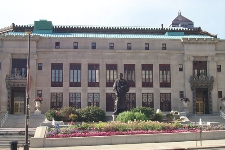In Columbus there is a Mayor, City Auditor, City Attorney and seven members of City Council. All officeholders are independently elected citywide and hold four-year terms.
GOVERNMENT IN COLUMBUS
In Columbus there is a Mayor, City Auditor, City Attorney and seven members of City Council. All officeholders are independently elected citywide and hold four-year terms.


The MayorAs leader of the administrative branch of government, the mayor assigns administrative responsibilities and appoints most directors to departments and divisions responsible for the delivery of a variety of public services. Independent commissions, as specified in the City Charter, however, appoint some directors.
The Auditor
The Auditor is the city's chief accounting officer and maintains the city's financial records-including receipts, disbursements, assets and liabilities.
This branch of government also oversees the collection of city income taxes.
The City Attorney
Acts as the legal adviser and counsel for the city, elected officials, officers and departments in matters relating to their official duties.
As the city's chief legal officer, The City Attorney directs its legal branch and prosecutes or defends all lawsuits for and on behalf of the city.
City Council
The legislative branch of the city has the responsibility of adopting annual operating and capital budgets, city contracts that exceed $20,000 or $100,000 (if authorized from a Universal Term Contract) and enacting Columbus City Codes.
In addition to its fiscal control and regulatory authority, City Council establishes land-use policy through its zoning powers.
The legislative process
City Council legislation comes in one of two forms:
- Resolution: expresses the views of City Council on a particular topic
- Ordinance: directs that a specific action is taken
Resolutions are adopted. Ordinances are passed. In order to enact a new law, or to enact any legislation necessary for the operation of the city, action is required by City Council and at least one other branch of municipal government.
Such ordinances allow for the purchase of equipment, supplies or services. Others change the zoning standards for specific property. Still others make amendments to the City Codes.
Municipal elections are held on odd-numbered years. The City Attorney, City Auditor and three Councilmember seats are elected at one election. The Mayor and four Councilmember seats are elected at the following election.
Columbus City Council voted to place a charter amendment on the May 8, 2018, ballot that increases the size of Council to nine; institutes at-large, by-place elections and addresses the appointment process. Council Places Charter Amendment on Ballot